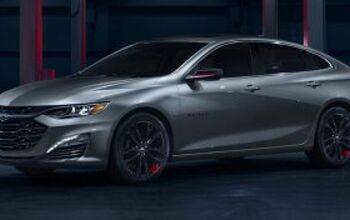Lawsuit Accuses GM of Using Defeat Devices in Duramax Diesel Pickups

Suing automakers over diesel emissions violations is quickly on its way to becoming passé.
Since Volkswagen admitted to installing software that circumvented pollution laws, regulators have been on the hunt for their next big target. While it might make their efforts seem like a bit of a witch hunt, there’s good reason to be on the lookout. Studies have shown diesel emission levels are often much higher than analysts expected, with experts attributing the results to the high probability that other automakers are skirting regulatory guidelines — likely by way of defeat devices.
Daimler, Renault, and PSA Group are all being investigated in their home countries as FCA faces legal action within the United States.
General Motors is now being sued for allegedly installing defeat devices in its trucks to sidestep emissions tests, making it the sixth major manufacturer accused of diesel cheating since 2015. However, General Motors isn’t dabbling in gray areas, acting confused, or assuring the public it will get to the bottom of the accusations. It says the claims against it are flat out wrong.
Pat Morrissey, director of corporate communications at GM, issued a concise two-sentence response after news of the lawsuit broke. “These claims are baseless and we will vigorously defend ourselves,” Pat Morrissey stated. “The Duramax Diesel Chevrolet Silverado and GMC Sierra comply with all U.S. EPA and CARB emissions regulations.”
Owners and lessees of some 705,000 pickups powered by Duramax diesels filed a class-action lawsuit on Thursday, claiming GM had installed defeat devices in Chevrolet Silverados and GMC Sierras from 2011 through 2016. According to Bloomberg, it’s their assertion that the automaker misrepresented the Duramax’s abilities and that the system produces two to five times the legal limit of pollutants under normal driving conditions.
“GM claimed its engineers had accomplished a remarkable reduction of diesel emissions,” attorney Steve Berman said in the formal complaint. “These GM trucks likely dumped as much excess poisonous emissions into our air as did the cheating Volkswagen passenger cars.”
Berman is also currently representing drivers and dealerships in the litigation against FCA and previously went up against Volkswagen before it was slapped with $24.5 billion worth of penalties, fines, and vehicle recalls. Another similar thread between the cases is the inclusion of German auto supplier Bosch.
In the case against General Motors, Bosch is named as a defendant involved in the installation of three separate defeat devices, particularly those relating to the emission of nitrogen oxide pollutants. However, GM has already disclosed numerous on-board devices that help mitigate NOx levels, all of which have received EPA approval. Among the most noteworthy are the Duramax’s selective catalyst reduction system and treated diesel exhaust fluid (DEF), both of which serve to reduce NOx emissions. Both are standard items on modern diesel trucks and have proven to be one of the better ways to adhere to emissions guidelines without sacrificing performance.
As the name suggests, the catalyst reduction system is selective and not perpetually active — meaning there are occasions where emission levels can fluctuate outside of prescribed levels (when the vehicle is warming up, for example). Adequate levels of DEF are also required for the process to convert NOx into nitrogen gas and water. Without it, the truck’s computer eventually forces it to run in a more lethargic mode and may eventually forbid the vehicle from restarting.
In addition to this, Duramax-powered vehicles have a Regen mode that serves to burn off soot accumulated in the diesel particulate filter (DPF). During the process, fuel is injected into the exhaust in order to raise exhaust gas temperatures high enough to clear the DPF.
[Image: General Motors]

A staunch consumer advocate tracking industry trends and regulation. Before joining TTAC, Matt spent a decade working for marketing and research firms based in NYC. Clients included several of the world’s largest automakers, global tire brands, and aftermarket part suppliers. Dissatisfied with the corporate world and resentful of having to wear suits everyday, he pivoted to writing about cars. Since then, that man has become an ardent supporter of the right-to-repair movement, been interviewed on the auto industry by national radio broadcasts, driven more rental cars than anyone ever should, participated in amateur rallying events, and received the requisite minimum training as sanctioned by the SCCA. Handy with a wrench, Matt grew up surrounded by Detroit auto workers and managed to get a pizza delivery job before he was legally eligible. He later found himself driving box trucks through Manhattan, guaranteeing future sympathy for actual truckers. He continues to conduct research pertaining to the automotive sector as an independent contractor and has since moved back to his native Michigan, closer to where the cars are born. A contrarian, Matt claims to prefer understeer — stating that front and all-wheel drive vehicles cater best to his driving style.
More by Matt Posky
Latest Car Reviews
Read moreLatest Product Reviews
Read moreRecent Comments
- Namesakeone If I were the parent of a teenage daughter, I would want her in an H1 Hummer. It would be big enough to protect her in a crash, too big for her to afford the fuel (and thus keep her home), big enough to intimidate her in a parallel-parking situation (and thus keep her home), and the transmission tunnel would prevent backseat sex.If I were the parent of a teenage son, I would want him to have, for his first wheeled transportation...a ride-on lawnmower. For obvious reasons.
- ToolGuy If I were a teen under the tutelage of one of the B&B, I think it would make perfect sense to jump straight into one of those "forever cars"... see then I could drive it forever and not have to worry about ever replacing it. This plan seems flawless, doesn't it?
- Rover Sig A short cab pickup truck, F150 or C/K-1500 or Ram, preferably a 6 cyl. These have no room for more than one or two passengers (USAA stats show biggest factor in teenage accidents is a vehicle full of kids) and no back seat (common sense tells you what back seats are used for). In a full-size pickup truck, the inevitable teenage accident is more survivable. Second choice would be an old full-size car, but these have all but disappeared from the used car lots. The "cute small car" is a death trap.
- W Conrad Sure every technology has some environmental impact, but those stuck in fossil fuel land are just not seeing the future of EV's makes sense. Rather than making EV's even better, these automakers are sticking with what they know. It will mean their end.
- Add Lightness A simple to fix, strong, 3 pedal car that has been tenderized on every corner.


































Comments
Join the conversation
There is a big difference between actively defeating emissions controls (VW) and trying to keep close to the emissions limits (FCA has reported that was what they targeted). Now the lawyer community can smell a big payday to just have their complaints go away. There can be no doubt that this community of lawyers will be trying to gather diesel owners of every make and do the same thing. I expect ford, BMW and any other maker to get hit with these suits regardless of their merit and evidence. That is the key. Used to be that a complaint had to have credible evidence which so far regarding FCA and GM now with others coming soon there isn't any. That under the legal system constitutes a frivolous lawsuit when judges actually used judgement. Regarding Bosch. This is a joke Bosch supplies the auxiliary emissions devices and the manufacturer does the programming. How are they at fault? They have no control over how their devices are used. Ridiculous. By the way there is no evidence that the emissions levels used by the EPA which is a derivative of CARB are based on scientific evidence but typical California hysteria...........
That is one ugly-ass truck.